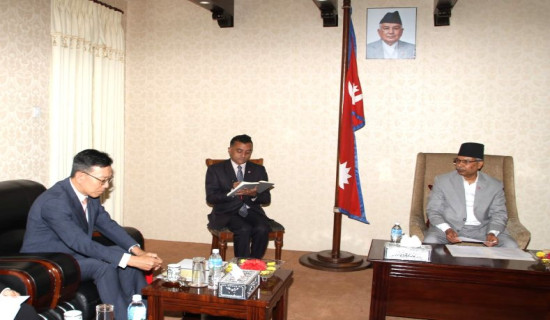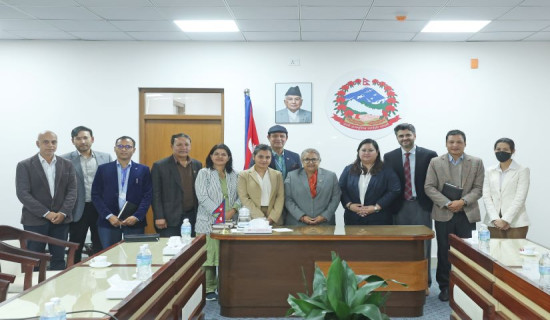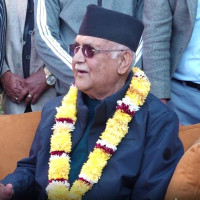- Friday, 7 November 2025
21 transport offices to issue embossed number plates
By A Staff Reporter,Kathmandu, Sep,1: The government has reiterated that the installation of embossed vehicle number plate (EVNP) on vehicles is mandatory and binding, even as it temporarily exempts vehicle owners from immediate fines.
While the policy has sparked widespread criticism over high fees and the absence of Nepali language on plates, the Department of Transport Management (DoTM) has made it clear that it will not retreat from its decision.
The Department announced that from September 17, 2025, embossed plates will be compulsorily issued from 21 provincial transport offices. Currently, the DoTM has managed to issue EVNP from nine offices across the country. Of them, three from Kathmandu Valley -- Ekantakuna, Teku and Gurjudhara-based transport offices, and one each from Hetauda, Kaski, Rupandehi (Butwal), Dang (Tulshipur), Banke (Nepalgunj), and Surkhet.
Since the notice regarding mandatory installation of embossed number plates was published, public backlash has grown, with transport associations and civil society groups staging demonstrations against what they call an expensive and insensitive policy.
Despite this, the Department has expressed its firm commitment that vehicle owners who fail to comply will be barred from essential services such as renewal, tax clearance, and ownership transfer. Ganeshman Singh Rai, Information Officer for the DoTM, has clarified that the Department cannot reduce fees on EVNP unless the existing regulation is amended. “The fees are stipulated under the law. Unless the regulation is revised, no reduction is possible,” he claimed.
Currently, the government charges Rs. 2,500 for two-wheelers, Rs. 2,900 for three-wheelers, Rs. 3,200 for four-wheelers, and Rs. 3,600 for heavy vehicles.
On the issue of Devanagari script, Rai stressed that the Supreme Court has already ruled in favour of English-language plates, rejecting demands to use Nepali script. “The Department must comply with the court’s verdict. We cannot go against it,” he stated.
Critics have also raised concerns about the use of Radio Frequency Identification (RFID) technology embedded in the plates, alleging risks of surveillance. The Department, however, maintains that RFID was chosen in 2016 over GPS specifically to protect citizens’ privacy. While RFID allows vehicle tracking for enforcement purposes, officials insist it does not infringe on personal data, unlike GPS.
The government faces a major challenge in meeting its contractual obligation, embossing 2.5 million plates by November 26, 2025. So far, only 800,000 plates have been printed, against an order of 1.2 million. If the target is missed, the government risks paying penalties to the contractor, a joint Bangladeshi-American company, Decatur-Tiger IT, which was awarded the project in 2016.
The agreement requires the contractor to produce 2.5 million plates, supply RFID gates and handheld devices, and eventually hand over the plate-printing factory to the government, in return for Rs. 3.87 billion. However, with delays caused by legal disputes and logistical hurdles, meeting the latest deadline appears increasingly difficult.
“If the deadline is not met, the government will be liable for compensation unless both parties agree to extend the contract period,” Rai admitted, though he declined to specify the potential penalty amount.
Additional manpower on hire
To accelerate installation, the Department plans to mobilise workers with a minimum qualification of grade 10 who will also undergo computer literacy and specialised training on embossed plates.
Wages for installation staff will not be paid by the contractor but directly by the Department, in line with the government’s minimum daily wage system. The Department needs to hire additional manpower to expedite installation drive, said Rai.
Starting from September 17, embossed plates can be installed from two offices in Koshi Province, four in Madhes Province, five in Bagmati Province, two in Gandaki Province, three in Lumbini Province, one in Karnali Province and two in Sudurpaschim Province. Additional installation offices will also be facilitated through other authorised bodies if needed, according to the Department.
















